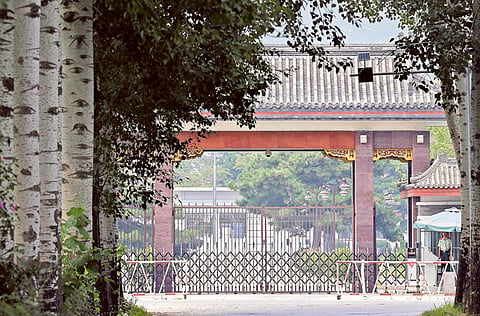A jail for elite: better food, beds, cells
Qincheng Prison has for half-century housed miscreants from political elite

Beijing: China’s privileged remain privileged even in prison.
When Gu Kailai, wife of disgraced Chinese leader Bo Xilai, is sent to prison following her conviction for the murder of a British businessman, she’s likely to end up in an exclusive jail that has cells with sofas and private bathrooms.
Tucked in the hills an hour’s drive north of Beijing and hidden behind several guarded, unmarked gates, Qincheng Prison has for a half-century housed miscreants from the political elite: purged Communist Party rivals, corrupt politicians, newspaper editors critical of the government, leaders of the 1989 Tiananmen Square democracy movement, Chairman Mao’s power-hungry widow.
“The prison is known because it has locked up China’s most famous political prisoners,” said Dai Qing, a journalist and the adopted daughter of a revolutionary general who spent about six months in Qincheng after taking part in the 1989 Tiananmen movement though she was never formally charged.
When the metal-wrapped door opened to her cell, Dai was “pleasantly surprised,” she recalled in an essay written in the 1990s.
“My cell room was quite sizeable,” at about 20 square meters, or 215 square feet, Dai wrote. The cell was freshly painted and had a separate washroom, and while the bed was a wooden plank on two low benches, it was padded with two thin military quilts and covered in new bedding, she wrote.
Qincheng is no ‘Club Fed’ - the nickname for the comfortable minimum security federal prisons for white-collar criminals in the US. Previous inmates have described being mistreated and watched at all times. They have complained about the food and the isolation. Still, it is plush by the standards of Chinese prisons, where cells are filled with a dozen or so inmates, long hours of physical labour are required and beatings by inmates and guards routine.
The better conditions in Qincheng underscore how the Chinese elite take care of their own, even in disgrace. So many higher-level officials are being felled in crackdowns on endemic corruption these days that China recently opened a new model prison, Yancheng, with a wing for the elite. The cells there are similar to hotel rooms, though with glass walls between bed and bath, and have balconies for exercise or clothes-drying, according to state media reports.
Still, nothing says “politically connected” like Qincheng.
“This is a special prison,” said Bao Tong, a former high-level party official who spent seven years in Qincheng for opposing the crackdown that ended the Tiananmen protests.
The Public Security Ministry, which oversees Qincheng, denied a written AP request to visit the prison and declined any interview about it.
Dubbed Project No 157 and built with the help of the Soviet Union, Qincheng opened in 1960 to replace a dilapidated jail holding political prisoners and military commanders from the Nationalist government ousted by the communists in the civil war between 1945 and 1949.
To shine a positive light on the new regime, Qincheng was designed with amenities such as flush toilets, medical clinics and fitness facilities that were out of reach for most Chinese at the time.
But conditions inside the four U-shaped, three-story brick buildings varied. One known as Section 204 was the best, outfitted with carpeted floors, sofa beds and hot-water thermoses. Section 204 inmates received meals comparable to those provided to Cabinet ministers. They could drop a sugar cube or two into their lemon tea.
When Chairman Mao Zedong unleashed waves of purges in his radical Cultural Revolution in the late 1960s, Qincheng was overwhelmed. The prison was expanded to accommodate the influx, and conditions became more uneven. Torture became common.
Wu Faxian, an air force general purged ostensibly for plotting a coup, was kept in a cell one meter by three meters. “There was no desk or chair. My clothes and eating utensils were on the floor, and the bugs crawled into them,” he wrote in his memoir.
Once a month he received a haircut and a shave and shared one dull nail clipper with other inmates. A diet of coarse corn bread and boiled cabbage left him malnourished.
“Black dots kept appearing in front of my eyes, and sometime they were raining down,” Wu wrote.
When the political tide turned a decade later, Mao’s widow, Jiang Qing, was sent to Qincheng. Harry Wu, a US-based human rights activist who recently published a book on Qincheng, said Jiang was placed in a two-room suite with a private bathroom, possibly the best Qincheng could provide.
Conditions improved. Dai, the journalist, said gradually she was given newspapers and books from the jail library - William Shirer’s “The Rise and Fall of the Third Reich,” popular martial arts novels by Louis Cha and the Chinese classic “The Dream of the Red Chamber.”
Dai was allowed a two-hour break every day, though she was disappointed to find herself alone in a walled courtyard, watched over by guards. “Like caged lions and tigers, most of us walked back and forth impatiently,” she wrote.
Bao recalled the walls dividing the courtyards were so thick that guards could patrol on top of them. “They wore an ammunition belt, but I didn’t know if they were armed,” Bao said.
– AP


